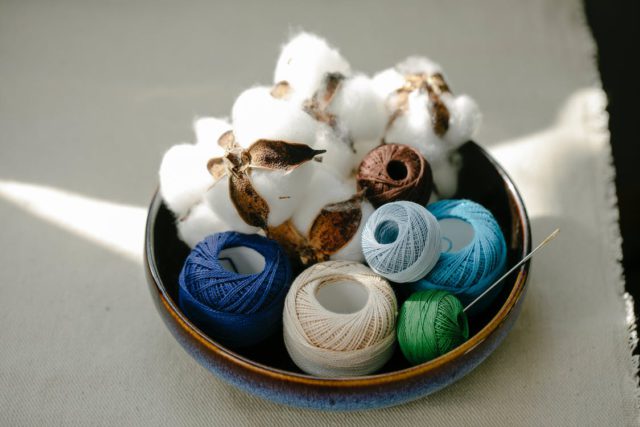The world demand for cotton is huge. Cotton is being produced at a production rate of 25 million tons a year. However, conventional cotton is sprayed with some of the worst pesticides to ensure yields. Those and other harmful chemicals involved in cotton production pollute waterways and harm farmers’ health.
Related article: How to Make More Ethical & Conscious Fashion Choices

Cotton is not only used to make clothes, bedding, towels, and other textile products. Cottonseed oil and other cotton by-products are also found in hundreds of processed foods. Cotton comes into contact with our skin every day, so consumers should be concerned about the origin of cotton and whether it is harmful to the body.
The best way to avoid cotton products that use pesticides is to buy certified organic. Here are reasons to choose clothes, bedding, and other products made from organic cotton.
Protect The Oceans from Microfiber Pollution
Casual clothing is made from synthetic fabrics such as acrylic, fleece, and polyester. During the washing process, these synthetic fibers are released into the waterway in the form of microfibers, which then follow the runoff into the ocean. Microfilaments entering the ocean threaten marine species and sensitive reef ecosystems.
Therefore, you should completely avoid synthetic fabrics, including conventional cotton blends, to reduce the synthetic microfibers released into the environment. Instead, choose clothing and textiles made from 100% organic cotton.
Protect The Livelihood of Local Workers
Organic cotton products are often taken care of by the locals. Supporting organic cotton products means you are supporting local workers who have stable and developed livelihoods.
Conserve Global Water and Energy Resources
In fact, the water demand for cotton is so high that cotton production has contributed to the depletion of water in cotton-growing areas. Figures show that it takes 1,800 gallons of water to produce enough cotton for a pair of jeans.
On the other hand, organic cotton has a much lower environmental impact. Organic cotton production uses 71% less water and 62% less energy than conventional GMO cotton production.
Reduce Exposure to Harmful Pesticides and Insecticides
Conventionally grown GMO cotton has large pesticide residues. It accounts for 25% of all pesticides used in the world.
In addition to being held responsible for the use of harmful pesticide chemicals, GMO cotton is also sprayed with large amounts of herbicides that can cause cancer in humans.
Organic cotton farmers use only organic fertilizers, herbicides and pesticides of plant origin, minerals and natural enemies to prevent pests. This reduces your risk of health problems while protecting farmers and reducing the environmental pollution.
Reduce Exposure to Chemicals in The Manufacturing Process
Many hazardous chemicals are used in the production of ordinary cotton clothing, depending on where the garment is made and what properties the manufacturer wants to achieve. Chemicals used in the production of conventional cotton clothing include chlorine bleach, ammonia, heavy metals, and phthalates, a known endocrine disruptor. Azo-aniline dyes are also commonly used. These dyes can cause mild to severe skin irritation, especially where there is friction between your skin and the fabric.
Organic cotton products, on the other hand, don’t use any of these chemicals and use only low-impact and reactive dyes for long-lasting color.

No Toxic Working Environment for Farmers
The cotton industry normally uses a lot of pesticides and herbicides that are harmful to the health of cotton farmers. In some places, it is also alleged that workers do not have access to protective gear or even clean water.
Therefore, organic cotton is better for farmers and their families. They deserve to live free of harmful, cancer-causing chemicals. Buying products made from organic cotton promotes safer working conditions for cotton growers.
Support Regenerative Agriculture
Responsible and sustainable organic cotton production offers many environmental benefits, including reducing soil-depleting factors such as synthetic fertilizers and pesticides, reducing fertilizer runoff, reducing emissions in the field, and less irrigation.
Choosing organic helps keep deadly chemicals out of water and land. These benefits help promote a healthy ecosystem, which is a core principle of regenerative agriculture.
Increase The Safety of You and Your Family
Organic cotton is the best choice for people with sensitive, allergic and chemically sensitive skin. In addition, organic cotton is softer and more durable because it undergoes less processing, without chemicals that weaken the fibers. You’ll notice your clothes feel better and last longer.
Choosing products made with organic cotton gives you peace of mind knowing that the items you wear or use are not toxic to you and the environment and do not contribute to supporting local labor and children.
You can also feel satisfied using your purchasing power to make a difference. By supporting the organic cotton industry, you can help change other brands and manufacturers into a more regenerative supply chain.
Promotion Of Biodiversity
Organic cotton uses less water and encourages biodiversity. Growers typically use more rainwater for irrigation and rely on beneficial insects to control unwanted pests.
Reduce Greenhouse Gas
Organic cotton produces about 46% less CO2 than conventional cotton. By using clothes made from 100% organic cotton, you are helping to reduce a large amount of C02 emitted into the atmosphere.
